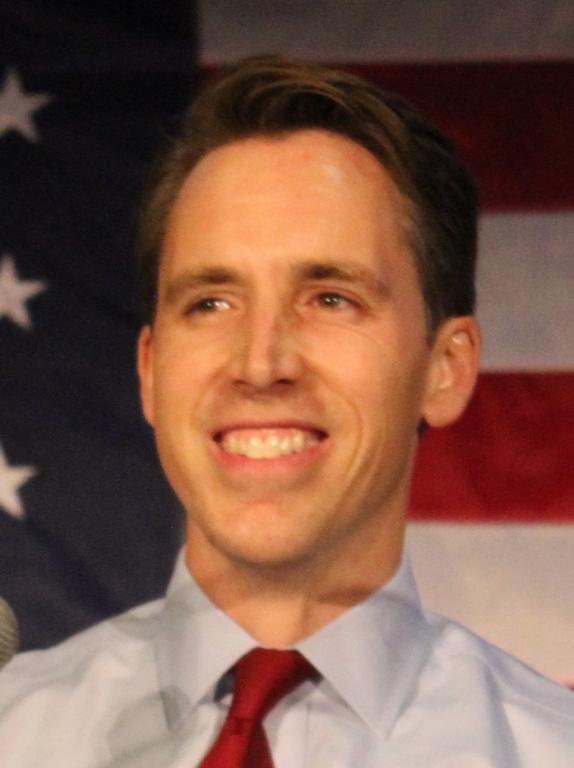We’ve blogged about Josh Hawley, who is not only a U.S. Senator (at 39, the youngest member of that body) from Missouri but a trenchant Christian cultural critic. Known for his attempts to bring the big tech companies under anti-trust law and his efforts to make the Republican party more populist, Hawley gave a speech that is attracting attention. In it, he develops the concept of the “Promethean Self” and its cultural, political, and governmental manifestations.
Conservative writer Michael Brendan Dougherty in discussing the speech says that Hawley “might be the most interesting thinker the U.S. Senate has seen since Daniel Patrick Moynihan.”
For basically my entire adult life, the default mode of Republican speechifying has been a kind of reheated “optimism” with lots of waxing poetic about the great reserves of American can-do waiting to be tapped. These attempts to recapture “Morning in America” have been delivered through clenched, Prozac-like smiles by men who promptly enter black SUVs to be hurried off back to their gated communities. I’ve always accepted that this is the way of electoral politics, which doesn’t have much to do with a conservative intellectual disposition that tends to be more dour, or at least skeptical.
But Hawley’s speech went from. . . baleful statistics [about inequality, the loss of community, the struggles of the working class, and the soaring suicide rate] to a prophetic critique of a cult of the individual and self that is “so thoroughly ingrained in American culture.”
I’m going to quote the speech at length. Notice too the theme of vocation, which I’ll draw your attention to by bolding. From Senator Josh Hawley’s Speech at the 6th Annual American Principles Project Gala (Nov. 20, 2019):
For years we have been told that to be truly free is to be without the constricting ties of family and place, without the demands of faith or tradition.
We’ve been told that liberty means release, separation. And this view has had its effect. . . .
This is the individual as creator, as self-creator, maker of meaning and author of reality—rather like Prometheus who in the ancient myth created all mankind. So call this view of the human person the Promethean self.
As it took hold in twentieth-century America, the Promethean ideal taught that the individual self exists apart from all social ties and relations. Our family, our religious society, our neighborhood and town—these communities don’t constitute one’s identity, because who one truly is exists separate from all of them.
Instead, the Promethean self creates her own reality, her own truth. She forges her own meaning. And this effort at self-creation is a solitary business. The demands of community too often get in the way.
For the Promethean self, the only time community is truly worthwhile is when it is freely chosen, and then only on the individual’s own terms. For the claims of community must never inhibit the individual’s powers of self-expression. Or so we are told.
This Promethean idea has by now become so thoroughly ingrained in American culture, so ubiquitous in our public life, it’s impossible to escape it.
It is preached in our universities, celebrated in our music, rehearsed in our literature and film. It’s even the stuff of judicial decisions.
Remember this? “At the heart of liberty is the right to define one’s own concept of existence, of meaning, of the universe, and of the mystery of human life.” That’s Justice Anthony Kennedy in Planned Parenthood v. Casey, 1992. I doubt you needed the citation.
And you can see how this idea of the Promethean self, the self-creating, self-sustaining person, suggested a particular kind of politics—a politics centered on the solitary individual.
In this kind of politics, individual choice, and even more, individual achievement are what count. And that makes sense: if our personhood is something we create and not discover, if it is something we assemble entirely for ourselves, then personhood is an achievement; it is something we do.
And place and home don’t matter much. And civic participation is beside the point. And church, synagogue, family—these are fine, but only as groups of individuals, and only if they don’t have too much say in society and don’t control too much of your life.
The Promethean vision has an economic side as well. It gives us an economic policy focused on individual advancement, where advancement means making more money and consuming more stuff. So in popular culture billionaires become heroes, and the everyday working man becomes just some guy who never realized his potential.
Both major parties have embraced some version of this Promethean politics. And both have made it central to their agenda, for decades.
But if you want a life built around home and family; if want to live in the place where you grew up, with the people you love and know; if your ambition is not to start a tech company but to serve on the PTA, well, this politics doesn’t have much to offer you.
And that’s the problem with the Promethean self. It’s an idea that rewards the privileged and entrenches the powerful. And here’s why.
If freedom is about creating your own reality, then those with the greatest access to power will be the most free. And in today’s society, that means those with the most money, the most credentials, with the most influence.
And let’s be honest, a society that prizes the self-creating and the powerful will prize fame and fortune and status, and look down on, or just ignore, those who don’t have them.
And if this sounds like 21st century America, it should. Because our society increasingly rewards credentials and degrees, it lionizes wealth and the size of your social media audience, and it calls these things “merit.”
As if getting them makes you more valuable than anyone else. As if success is a matter of what we can amass.
And where does this leave those without power or money? On their own.
If you’re a worker with a high school degree in the urban core who can’t get a good job, you’re told it’s your fault and you should work harder, get more education, stop being lazy.
If you’re a farmer or working a trade in the middle of the country and can’t support your family on what you bring home, you’re told you should move, that smart people live in cities, and you should have made better life choices.
It’s no wonder so many Americans feel so unappreciated and unheard.
It’s no wonder so many young people feel desperate to get another credential, another good grade, another like on Instagram—so that they can matter.
It’s no wonder so many of our fellow citizens feel so desperately alone.
Because here’s the reality. The Promethean self, splendid in his isolation, needing nothing from others but the space to create, doesn’t exist. The Promethean ambition leaves us lost and unmoored. And the market worship and cultural deconstruction the Promethean vision has inspired have failed this country.
The collapse of community in America has been underway for decades now, and as it accelerates, it threatens our common liberty.
Our families and farm cooperatives, our churches and labor unions—they bring us together, they relate us to each other, they tell us what we have in common. And they tell us a story about ourselves, as Americans.
They tell us that what unites us is not race or ethnicity or religious confession. What unites us is the deep conviction that every life matters, that you matter, that every person is uniquely called and uniquely gifted.
They tell us that you don’t have to be rich or famous to be important, that ordinary life—the life of work and marriage and family and worship—that life is valuable, it’s wonderful, it’s what we were meant for, it’s what changes the world.
Our communities of home and worship and labor tell us all this because they draw us into living these convictions together. And this country is built on those convictions. Which means the future of this country depends on rebuilding the communities that make us who we are.
Because in the end, it is community that makes authentic individual life possible.
It’s community that gives individuals strength. It’s community that helps us find moral purpose. It’s community that joins us together to exercise control over our lives.
And so as it turns out, our cherished belief in the liberty of every individual, and the dignity of every person, is rooted in the life we share together.
For in the words of an old theologian, “We do not exist in isolation, [but in] a world of love and hate, blessing and curse, service and destruction . . . where nobody, fundamentally speaking, belongs to himself alone.”
That’s something the Promethean vision has never understood. But then, the Promethean vision never really understood the individual—or love, or liberty. And it is time now to leave Prometheus where he belongs, in the myth of the past. . . .
We must forge in this century a new politics of family and neighborhood—a new politics of love and belonging—a new politics of home.
Photo: Josh Hawley by Natureofthought [CC BY-SA 4.0 (https://creativecommons.org/licenses/by-sa/4.0)] via Wikimedia Commons













